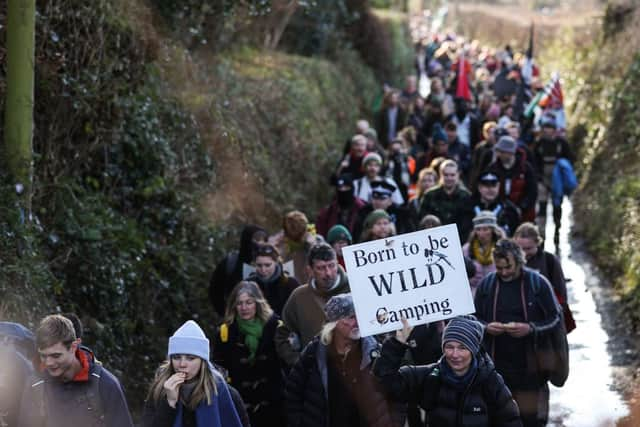Right to Roam: 'Mass trespass' planned for Dartmoor to protest 'absurd' access islands
and live on Freeview channel 276
Hundreds of Britons fighting for their right to roam are set to descend on Dartmoor en masse this week, in what organisers are calling the largest mass trespass in a generation.
The event, organised by campaign group Right to Roam, is in protest of so-called "access islands", an area of land the public has the right to access, but no legal way to get there without crossing private property. Supporters will gather at Vixen Tor, in Devon, on Friday (24 February), to make their way to one of these places - by any means necessary.
Advertisement
Hide AdAdvertisement
Hide AdRight to Roam says there are at least 2,500 of these access islands in England alone, many of which require trespassing to get to them. The issue, they say, arose the Countryside and Rights of Way Act (2000) only gave people a right to roam over certain types of landscapes, known as "access land". These include mountains, moorlands, heathlands, downlands and commons – covering about 8% of England.


But many of these landscapes are highly fragmented - with PA reporting much of England’s downland, for example, was ploughed up for agriculture after the Second World War. This means that oftentimes access islands are completely surrounded by other landscape types, where the public has no legal right to walk.
This week's trespass will start at a wall that separates open access and private land in Dartmoor. Campaigners have been asked to come up with creative ways to travel to the island to highlight the "absurdity" of the current law - with one group of performers even planning to bring a large boat to symbolically “sail” there.
Right to Roam spokesman Lewis Winks said access islands were a clear example of why England's current access rights system was "broken". "Often people don’t know where they have a right to go in the countryside. It’s ridiculous that the public have to trespass to reach these fragments of land where they have a legal right to roam – all because of our piecemeal approach to access in this country."
Advertisement
Hide AdAdvertisement
Hide AdHe said England could stand to learn from Scotland, which has no access islands due to creating a default right of access to most land and water in 2003 - to be exercised responsibly and subject to sensible exemptions and rules. “With political parties pledging to increase access to nature in England it’s vital they learn from the mistakes of the past, and look instead to follow successful examples like Scotland.”
The right to roam is a hot-button issue in the wider Dartmoor region. Last year, the Court of Appeal ruled that members of the public had the right to "wild camp" in Dartmoor National Park, overturning an earlier ruling that allowed a private land owner to remove people camping on his estate.
Wild camping had originally been protected by the Dartmoor Commons Act 1985 - but in January 2023 a High Court judge ruled it did not give people the right to pitch tents overnight on Dartmoor Commons without landowners’ permission. Until the High Court ruling, campers could access nearly 52,000 acres of common land across the national park and could stay overnight as long as they followed a code of conduct. Dartmoor was one of the last places in England and Wales where visitors had an assumed right to wild camp without gaining the permission of the landowner.
Millionaire hedge fund manager Alexander Darwall, who owns land in the park with his wife, brought the successful legal challenge against the Dartmoor National Park Authority (DNPA), claiming some campers were causing problems to livestock and the environment. The judgment was branded a “huge step backward” by campaigners who claimed there was a “long-established precedent” of wild camping in the national park in Devon, and appeal judges ultimately overturned the decision.
Comment Guidelines
National World encourages reader discussion on our stories. User feedback, insights and back-and-forth exchanges add a rich layer of context to reporting. Please review our Community Guidelines before commenting.
